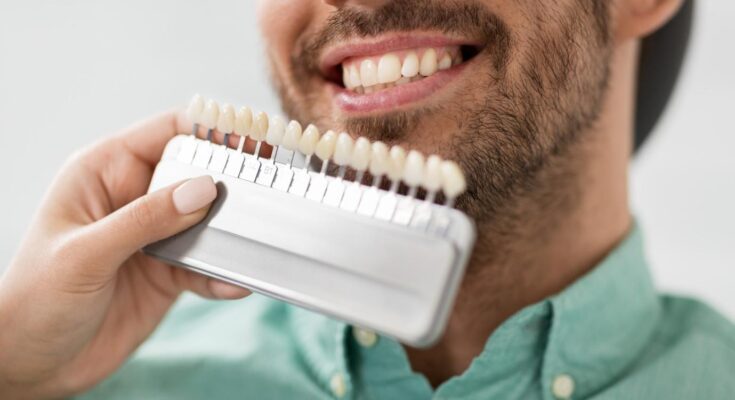Are you thinking about getting false teeth? Maybe you’ve heard some stories from friends or family and are wondering what it’s really like to have them.
There are a lot of benefits to getting dental implants, but it isn’t right for everyone. There are plenty of situations where fake teeth are a great choice!
In this guide, we’ll go over the pros and cons of different types of fake teeth. That way, you can determine if they’re right for you. Let’s begin!
Flexible Dentures
Flexible dentures are made from plastic-based materials and are less noticeable than traditional dentures because they come in a range of natural colors. They are removable and need a little more care and maintenance than regular dentures.
Pros of Flexible Dentures
The pros of flexible dentures include comfort, convenience, and affordability. They are made from a thermoplastic material, making them lightweight and easy to wear. Additionally, they are often much less expensive than traditional rigid dentures.
Flexible dentures fit the contours of your mouth more closely than their rigid counterparts, making them more comfortable to wear. They are also easier to clean and maintain than traditional dentures.
Finally, you can remove flexible dentures for proper cleaning, and you can eat, drink, and talk more comfortably with them in place. They also make less bulk and don’t create problems with tissue irritation.
Cons of Flexible Dentures
Flexible dentures are not always the best option for patients who need replacements for missing teeth. Although they are lightweight and comfortable to wear, they have some negative aspects.
Firstly, they are more likely to break due to their materials, making them not the best permanent solution for replacing teeth. Additionally, they require more frequent professional dental visits in order to adjust them due to their malleable nature.
This could increase costs for some individuals. Additionally, the color will typically fade faster than traditional acrylic dentures compared to conventional dentures.
Removable Dentures
The removable dentures are typically made with a light plastic or metal frame that fits snugly over teeth and gums. They may also include artificial teeth, or denture teeth, that fit into the frame. The denture frame is typically held in place by clasps and can be easily removed for cleaning.
Pros of Removable Dentures
There are various advantages to choosing removable dentures that make them a popular choice for those seeking dental improvements. The biggest advantage is that removable dentures are less invasive than traditional implants or bridges, meaning you don’t have to undergo an extensive procedure for installation.
In addition, removable dentures are more affordable than permanent solutions they are more affordable upfront and over the course of time. Removable dentures can be removed and cleaned on a regular basis, which ensures that they are kept in excellent condition.
Cons of Removable Dentures
Removable dentures come with quite a few drawbacks for some people. They can be a hassle to maintain and can slip out of place when eating or speaking. The appliances may need to be adjusted and require frequent remakes due to changes in the shape of the mouth over time.
The patient may also experience sore areas from where the denture rests on the gum tissues. In some cases, the dentures may cause temporary alteration to the shape and length of the facial profile.
Full Dentures
Full dentures are a type of prosthetic device used to replace a person’s missing teeth. They are typically made from acrylic resin for the gum-like base and crafted denture teeth which are designed to closely match the look and feel of natural teeth. They come with metal clasps that help to secure the denture in place within the mouth.
Pros of Full Dentures
Full dentures offer many advantages, especially when it comes to replacing missing teeth. For starters, full dentures are removable. This gives the wearer flexibility in being able to take them out when needed and prevents them from needing to be surgically fixed into place.
Full dentures are typically very affordable, with many insurance plans covering part of the cost. Full dentures can also be adjusted flawlessly to the wearers existing teeth, making the transition comfortable and natural-looking.
Cons of Full Dentures
One major con of full dentures is that they require regular maintenance and frequent replacement. Over time, the fit of the dentures may become too loose or too tight, and they may need to be adjusted or relined.
Other cons include the fact that they can interfere with eating and speaking and can take some time to get used to wearing. Dentures can also be prone to infection and should be handled with care when cleaning.
Partial Dentures
Partial dentures not only provide a proper appearance, but they can also help prevent adjacent teeth from shifting due to the missing tooth. These dentures are held in place through clips or clasps that attach to existing teeth and are easy to adjust or remove when needed.
Pros of Partial Dentures
Partial dentures can bring about a wide variety of beneficial outcomes for those who may have missing teeth. Firstly, partial dentures replace the functionality of lost teeth, allowing those who wear them the ability to speak or chew with greater ease.
They also offer a great way to maintain facial structure and improve facial symmetry. Moreover, partial dentures are relatively inexpensive when compared to other tooth replacement solutions, such as dental implants or bridges.
Cons of Partial Dentures
Dentures are prone to chipping and cracking and require frequent repair or replacement which can be costly. Additionally, dentures can be tricky to get used to as many people experience slippage and ill-fitting dentures that cause irritation to the gums and jaw muscles.
Partial dentures also require the person wearing them to take special precautions when eating as they must avoid hard, sticky, and crunchy foods in order to protect the dental prosthesis.
If you think dentures are not the right option for you, research about dentures alternatives and see which suits your preference.
Learn More About Fake Teeth
Fake teeth are a great option for many people looking for an affordable dental solution for their dental needs. From a traditional set of braces to a complete set of dental implants, the pros and cons of these fake teeth should be weighed out before making a decision.
Did you find this article helpful? Check out the rest of our blog for more!


